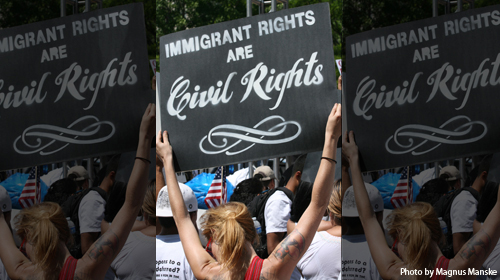After Supreme Court’s SB 1070 Decision, Federal Court Rules on South Carolina’s Anti-Immigrant Law


Today, a federal court in South Carolina upheld most of its original order blocking key provisions of South Carolina’s anti-immigrant law from going into effect. The court’s ruling today makes it clear that states like South Carolina cannot independently criminalize the act of transporting or harboring certain immigrants, or the failure to carry federal immigration papers. In light of the Supreme Court’s decision in Arizona v. United States, however, the court modified its original decision to block the law’s “show me your papers” provision. But today’s decision clearly states that the law does not allow South Carolina officers to detain individuals solely to verify their immigration status.
This comes as a relief to all individuals in South Carolina, as it is well known that laws like these instill an overwhelming fear in communities and can even turn neighbors against each other. One of the plaintiffs in our case expressed these serious concerns in a declaration to the court. A Venezuelan-born, lawful permanent resident raised concerns that due to her foreign accent she feared being stopped by police who could detain her if they suspected she was undocumented. She was also justifiably concerned that she could face prosecution for driving a friend who lacks lawful status for regular hospital visits in Charleston, or for providing shelter in her own home for those in need. Thankfully, the two provisions criminalizing such humanitarian gestures were struck down, and under the direction of the court, officers are not permitted to detain individuals solely on the suspicion that the person may be undocumented.
Andre Segura, staff attorney with the ACLU Immigrants’ Rights Project, said today, “The court’s decision follows a string of rulings in South Carolina and other states that have dealt a blow to state anti-immigrant laws by blocking most parts from going into effect. The court reaffirmed that it would be unconstitutional for state and local officers to detain individuals on the basis of their status alone, and left open the door to future challenges involving civil rights abuses under this law. We will continue to closely monitor the law's enforcement in order to ensure people's basic rights are protected."
It is now more important than ever for all South Carolinians to understand our constitutional rights. Everyone in this country has fundamental rights – whether you have papers or not. The court’s decision did not change that. While South Carolina officers may now ask immigration-related questions, you do not have to give any information about your immigration status, where you were born, or how you entered the country. And if you are arrested, you have the right to remain silent and ask for a lawyer.
The ACLU and other national and state civil rights groups will remain vigilant, closely monitoring the implementation of the law and will be ready to hold police accountable for any and all unconstitutional conduct.
Learn more about immigrants' rights: Sign up for breaking news alerts, follow us on Twitter, and like us on Facebook.


